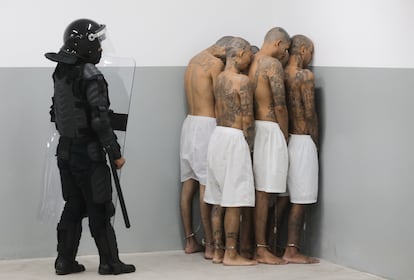Nayib Bukele and his strongman myth
Shortly after the US government accused his administration of negotiating with gangs, El Salvador’s president made a political calculation and responded with a heavy hand

“Strong men create good times...” tweeted Nayib Bukele on February 28. It’s one half of a syllogism that ends with the dubious conclusion, “weak men create hard times.” The president of El Salvador has come under heavy fire for a security strategy that began with the state of exception decreed a year ago. While the measure enabled him to corral the country’s two biggest criminal organizations – MS-13 and Barrio 18 – the iron-fisted attack on crime has come at the cost of an intolerable deterioration of human rights. So say several international organizations, including Human Rights Watch (HRW) and the United Nations Committee Against Torture.
Abuses, arbitrary detentions and repression have significantly reduced homicides after decades of violence. Despite all the criticism, most Salvadorans like the results according to opinion polls that give Bukele high approval ratings. The president will run for reelection in 2024 after the Bukele-appointed Supreme Court overturned the long-standing single-term limit. This has enabled him to dispense with the niceties of political debate and turn his “war on gangs” into an electoral advantage.
Bukele has created an image of a strongman who is always on offense and never playing defense. The recent photos and videos of the transfer of 2,000 gang members to a new mega-prison called the Terrorism Confinement Center aroused widespread outrage, especially abroad. But the move also reveals a political calculation made shortly after the US Department of Justice supported El Faro’s investigative reporting that exposed Bukele’s gang negotiations early in his presidency.
The same calculation leads Bukele to dismiss all criticism of his strategy as being soft on crime, a defense of criminality. It’s the well-worn populist tactic of “you’re either with me or against me.” He used the same approach to weaken and eliminate government counterbalances – a security policy is now another weapon for retaining power. Colombian President Gustavo Petro called the new prison for gang members a “concentration camp.” He said his country reduced homicide rates “not with prisons, but with universities, schools, spaces for dialogue, spaces for poor people to emerge from poverty.” Predictably, Bukele derided Petro’s claims.
Sign up for our weekly newsletter to get more English-language news coverage from EL PAÍS USA Edition
Tu suscripción se está usando en otro dispositivo
¿Quieres añadir otro usuario a tu suscripción?
Si continúas leyendo en este dispositivo, no se podrá leer en el otro.
FlechaTu suscripción se está usando en otro dispositivo y solo puedes acceder a EL PAÍS desde un dispositivo a la vez.
Si quieres compartir tu cuenta, cambia tu suscripción a la modalidad Premium, así podrás añadir otro usuario. Cada uno accederá con su propia cuenta de email, lo que os permitirá personalizar vuestra experiencia en EL PAÍS.
¿Tienes una suscripción de empresa? Accede aquí para contratar más cuentas.
En el caso de no saber quién está usando tu cuenta, te recomendamos cambiar tu contraseña aquí.
Si decides continuar compartiendo tu cuenta, este mensaje se mostrará en tu dispositivo y en el de la otra persona que está usando tu cuenta de forma indefinida, afectando a tu experiencia de lectura. Puedes consultar aquí los términos y condiciones de la suscripción digital.









































